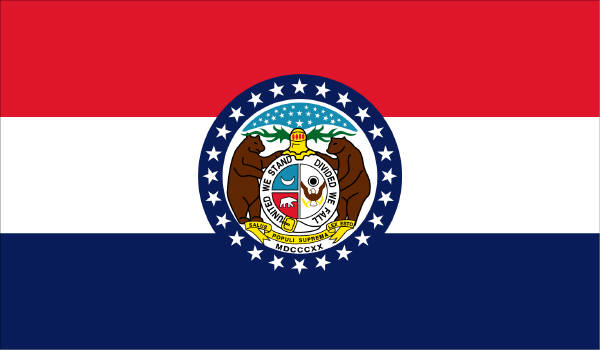Missouri Proposition 1, Campaign Finance and Disclosure Initiative (1974)
| Missouri Proposition 1 | |
|---|---|
| Election date |
|
| Topic Campaign finance and Election administration and governance |
|
| Status |
|
| Type Initiated state statute |
Origin |
Missouri Proposition 1 was on the ballot as an initiated state statute in Missouri on November 5, 1974. It was approved.
A "yes" vote supported enacting a law to establish new campaign finance and election laws, limit contributions and expenditures, require financial disclosures, create a bipartisan election commission, and enforce penalties for violations. |
A "no" vote opposed enacting a law to establish new campaign finance and election laws, limit contributions and expenditures, require financial disclosures, create a bipartisan election commission, and enforce penalties for violations. |
Election results
|
Missouri Proposition 1 |
||||
|---|---|---|---|---|
| Result | Votes | Percentage | ||
| 751,078 | 77.38% | |||
| No | 219,584 | 22.62% | ||
-
- Results are officially certified.
- Source
Text of measure
Ballot title
The ballot title for Proposition 1 was as follows:
| “ | Proposition No. 1- (Proposed by Initiative Petition) Provides for a new campaign financing and election law to replace portions of the present corrupt practices act; limits contributions and expenditures in elections for public office; requires reporting of such contributions and expenditures; requires disclosure of economic interests of a candidate and his family, and gifts and income received by a candidate or his family; creates a bipartisan election commission to administer the act; provides penalties for violations. | ” |
Path to the ballot
An initiated state statute is a citizen-initiated ballot measure that amends state statute. There are 21 states that allow citizens to initiate state statutes, including 14 that provide for direct initiatives and nine (9) that provide for indirect initiatives (two provide for both). An indirect initiated state statute goes to the legislature after a successful signature drive. The legislatures in these states have the option of approving the initiative itself, rather than the initiative appearing on the ballot.
In Missouri, the number of signatures required for an initiated state statute is based on the number of votes cast for governor in the state's most recent gubernatorial election. In two-thirds of Missouri's congressional districts, proponents must collect signatures equal to 5% of the gubernatorial vote for initiated constitutional amendments. A simple majority vote is required for voter approval.
See also
External links
Footnotes
State of Missouri Jefferson City (capital) | |
|---|---|
| Elections |
What's on my ballot? | Elections in 2026 | How to vote | How to run for office | Ballot measures |
| Government |
Who represents me? | U.S. President | U.S. Congress | Federal courts | State executives | State legislature | State and local courts | Counties | Cities | School districts | Public policy |



